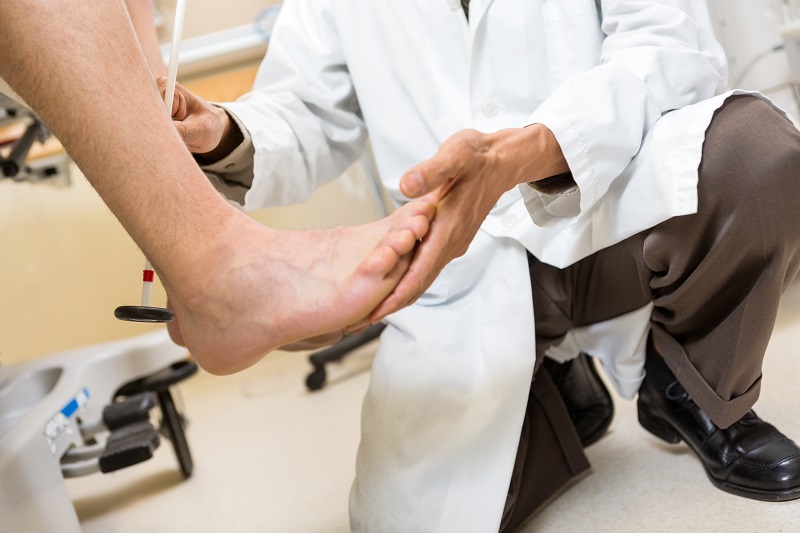Foot drop, or drop foot, happens due to muscle or nerve damage. People with foot drop can’t flex their foot upwards. As a result, their foot drags along the ground while they walk.
Foot drop is most often diagnosed by a physical exam. A doctor will observe the physical appearance of the feet and how a patient walks, as well as checking their leg muscles for weakness and their shins, toes and top of the foot for numbness. To confirm their diagnosis, doctors will perform a number of tests – X-Rays, ultrasounds, CT scans, MRIs or EMGs. Depending on the cause of the condition, a doctor may recommend braces, shoe inserts, physical therapy or surgery.
Diagnosing foot drop usually isn’t very difficult. Identifying its cause can be. It is important that the doctor investigate the true cause of the patient’s foot drop. Foot drop is usually not a disease in itself, but rather a symptom of other medical issues. In some cases, it can even be a sign of Cauda Equina Syndrome (CES), a rare emergency medical condition.
What Is Cauda Equina Syndrome?
Cauda equina syndrome occurs when pressure is applied to the cauda equina, a bundle of nerves located at the base of the spine, causing damage and impairing nerve function. The nerves run from the spinal cord into the lower extremities. The pressure can result from many sources, including spinal trauma and disease.
When the nerves become compressed or damaged, patients may experience a wide range of unpleasant symptoms, including:
- Severe lower back pain
- Pain, numbness, or weakness in one or both legs or feet, including “foot drop”
- “Saddle anesthesia” – loss of or altered sensations in the “saddle” region of your legs, buttocks, and inner thighs
- Problems with bladder or bowel function
- Poor circulation
- Sexual dysfunction
Foot drop can happen when the nerve damage caused by Cauda Equina Syndrome is so severe the signals from the brain telling the muscles to lift the foot don’t get through.
CES Is A Medical Emergency
Cauda equina syndrome is an emergency medical condition that requires immediate treatment – usually surgery – if the patient is to have a full recovery. This means that doctors and other healthcare professionals must be able to recognize the symptoms of CES in order to make a timely diagnosis.
Left untreated, CES can result in many permanent injuries, including: chronic pain, numbness, bladder and bowel dysfunction, sexual dysfunction and paralysis.
CES and Medical malpractice
A Cauda Equina Syndrome misdiagnosis can have devastating, sometimes irreversible effects on the sufferer. It can leave them with chronic pain, ongoing medical costs and an inability to return to work. When doctors and healthcare facilities fail to take the proper steps to confirm a diagnosis of CES and a patient is harmed as a result, that patient has the right to seek compensation for their damages through a medical malpractice lawsuit.
Lisa Levine is a nationally recognized medical malpractice attorney who specializes in Cauda Equina Syndrome cases. She has represented clients with CES all over the country, including Georgia, South Carolina, Florida, New Jersey, Massachusetts, Rhode Island, Connecticut, North Carolina, Vermont, Maine, New Hampshire, Delaware, Maryland, Virginia, Pennsylvania and New York.
If you or a loved one has suffered severe and permanent injuries due to a misdiagnosis of CES, please explore your legal options for CES via online contact form or toll-free at 855-551-8060. Lisa handles most CES medical malpractice cases on a contingency basis, which means there are no upfront costs for her outstanding legal services and you only pay a fee after Lisa wins your case.

